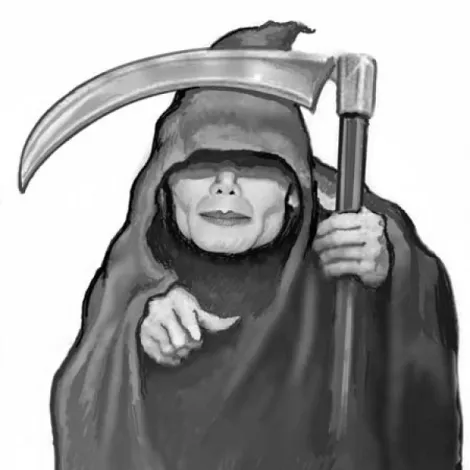
Death hangs over us, said the Roman orator Cicero, like the stone over Tantalus. Or like the pig that fell from a balcony a few years ago in downtown Dubrovnik, killing a hapless tourist from Brigham City named Howard Francom.
None of us know when that pig might fall and prematurely gather us into the bosom of Eternity. As Everyman, the protagonist in the medieval morality play, lamented to the Grim Reaper, “O Death, thou comest when I had thee least in mind.”
For whatever reason, death seems to be in the news more frequently than it usually is. It could be the bad mood everyone is in because of the general disappearance of money, and reading about death cheers us all up. In any event, death has always been a staple of the news business, even though death itself is hardly news, since it is one of the things that happeneth to us all.
Death becomes conventional news when it strikes famous people, or when the means of death are unusual or violent. In the last month or so, we’ve been particularly edified and entertained by the demise of three 20th century icons—Walter Cronkite, Michael Jackson, and Farrah Fawcett. Each death has presented us with an object lesson worthy of meditation.
Let’s begin with Uncle Walter, the most trusted man of his generation. He died full of years, full of accomplishments, and full of honors. His was a great American life. We should all be so lucky to live into our 90s, with the added benefit of leaving behind friends and family who still remember us.
Farrah Fawcett’s death from anal cancer was, by all accounts, a gruesome way to go. Her death reminds us that if Life is brief, Beauty is even briefer. An instructive memento mori is Farrah back then and Farrah at the end: the juicy swimsuit poster of the blond and benippled Farrah juxtaposed with her bag-of-bones appearance during her last-ditch quack treatments by German doctors in steel-rimmed eyeglasses.
Everything about the death of Michael Jackson is so bizarre that it’s hard to know where to start. The fact is that he was grotesque at the end, having made himself into a monster far creepier than the rivetheaded freak created by Dr. Frankenstein.
Jackson was both Dr. F. and the monster, his quest for self-transcendence ending with the pathetic mug shot after his arrest for child-molestation, a mug shot emblematic of his transformation from a precocious African-American boy to a sad-faced anorexic middle-age white woman whose beauty has long been botched by plastic surgery.
If there ever were a real Michael Jackson, he died a long time ago. He will be kept alive by pathological fans whose denial of his monstrous behavior is connected in some strange way to the denial of death itself.
Enough, or too much, of Michael Jackson. Let’s return to normality, and the healthy human interest in the extraordinary deaths of ordinary people.
In the news last week were three stories of death that were bracing reminders that our journey of life is subject to interruption in a variety of unexpected ways. Consider the presumably quiet, and presum- tale of a fellow passenger on our common trip to the Eternal Dark who met his end during an actual journey on a TRAX train. At the end of the line, the conductor discovered the man dead in the last car. This is a case of life reinforcing the message that we all reach the end of the line.
In a second story, a missing utilities worker in Riverton was found dead 20 feet down a manhole. He died doing his job. Such a death has been devoutly wished by sages ancient and modern: “When death comes,” said Ovid, “let it find me at my work.”
The deaths of the passenger on the train and the worker in the manhole were ably quick. These men were, in the eyes of the ancients, fortunate. Pliny the Elder voiced the common sentiment: “A quick death is the supreme good fortune of human life.”
Not so lucky in the manner of death was the Bountiful mom who was found stuffed in a freezer, allegedly shoehorned there by her son, who appeared in court last week for a sanity hearing.
If the above examples do not provide memento mori to your liking, consider the death of Nelson Rockefeller, aged 70, who left this life in the horizontal embrace of Megan Marshak, his 25-year-old “assistant.”